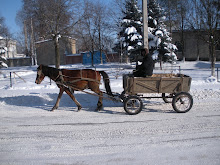This is a photo from my last day at the youth council. Near the top, you can see my friend Alina holding the homemade "yearbook" the youth made me. As of tomorrow, I am forevermore a "Returned Peace Corps Volunteer."
 I've spent the last three days saying farewell to my life in Moldova. Rather than attempting to duplicate my two years of service now, I encourage readers to use the sidebars on the right side of this page to browse through my posts on youth development, my community, and Moldovan culture. This blog is my story as a Peace Corps Volunteer in the Republic of Moldova. It exists to help promote Peace Corps' third goal of mutual understanding. If I've done my part, at least a few readers will have learned about the generosity, warmth, and beauty of the people that I shared about through this blog.
I've spent the last three days saying farewell to my life in Moldova. Rather than attempting to duplicate my two years of service now, I encourage readers to use the sidebars on the right side of this page to browse through my posts on youth development, my community, and Moldovan culture. This blog is my story as a Peace Corps Volunteer in the Republic of Moldova. It exists to help promote Peace Corps' third goal of mutual understanding. If I've done my part, at least a few readers will have learned about the generosity, warmth, and beauty of the people that I shared about through this blog.Please let me also recommend a few of my favorite moments in service to readers who happen to stumble across this page after I've stopped writing.
[+] A Moldovan Wedding
[+] A local fundraiser
[+] Youth taking control of their futures
[+] A campaign completed
To those readers I personally know (or may be related to!): Thank you for your support! I can't wait to see you all soon and share more about my amazing host country. I'll probably be like folks in the video below, so be ready!
To the readers I am not personally acquainted with, thank you for reading. Please continue to leave your comments and help make this space a conversation!
La revedere!



































